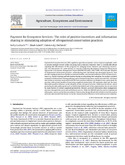| dc.description.abstract | Payment for Ecosystem Services (PES) applied to agricultural systems, such as tropical rangelands, seeks to provide multiple services while sustaining food production. However, there is considerable debate
regarding the effectiveness of PES programs for changing farmer behavior and enhancing conservation. We interviewed 101 cattle farmers in Costa Rica following the Regional Integrated Silvopastoral Approaches to Ecosystem Management Project (RISEMP) PES pilot (2002–2008). We evaluated adoption
of silvopastoral conservation practices—reintroducing trees and shrubs into permanent pastures—that
provide varying proportions of public and private benefits; we estimated influence of PES, technical assistance(e.g., farmer training) and information sharing on stimulating their adoption. Our analysis included evaluation of information sharing pathways and accounted for key farm capital characteristics. We found that technical assistance associated with PES had a positive influence on adoption rates, particularly for practices with private benefits of improving rangeland productivity. PES payments alone had the most
detectable, positive influence on the adoption of only one type of practice, multistrata live fences, which primarily provides public goods such as biodiversity habitat and carbon sequestration, but are perceived by many farmers to reduce rangeland productivity. Farmers accessed information about management practices through both social and institutional sources. While the RISEMP pilot focused on institutional information sources and technical assistance, future policy design should also include social information
networks and consider how farmer-to-farmer communication influences conservation practice adoption. | es |


